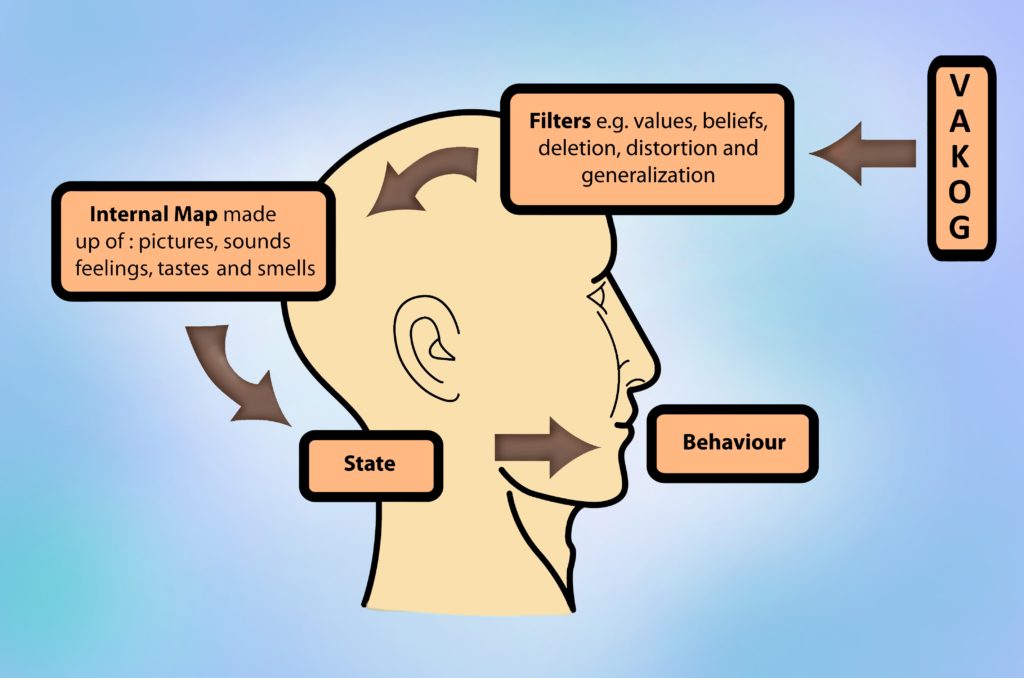The Meta Model – How Beliefs Are Born
Working with beliefs in coaching is a fundamental part of helping clients achieve positive change.
The Meta Model was the first model of NLP and was designed to help identify and categorise limiting beliefs into three groups: distortions, generalizations, and deletions.
This post will give a summary of how to use this model to identify these beliefs and to offer a challenge that will open up more flexible options.
NLP was co-created by Richard Bandler and John Grinder in the 1970s, aiming to study and model excellence in human behaviour and communication. Bandler and Grinder analysed successful therapists like Milton Erickson, Virginia Satir & Fritz Perls to understand the strategies behind their effectiveness.
In this process, they also drew inspiration from American linguistics Professor and political activist Noam Chomsky’s work on transformational grammar.
Chomsky proposed that language is not just a surface-level phenomenon but is governed by underlying deep structures. This concept led Bandler and Grinder to explore how people’s perceptions and thought processes might shape their language, behaviour and beliefs. From this exploration Bandler and Grinder created The Meta Model, which remains one of the cornerstones of NLP.
The Meta Model is a comprehensive guide to help categorise the various sentences a therapy patient uses to express their limiting beliefs. Once an NLP practitioner learns to identify these categories, they can then choose a respective challenge from a list copied from the famous therapists to target and hopefully heal that limiting belief.
The Meta Model has much wider applications beyond therapy. Many people use these types of words and phrases both consciously and unconsciously to upset themselves or mislead others.
In the video below, filmed on our How to Coach with NLP course below I explain the process – how an often perfectly innocent remark from a parent to a child, can show up later as a deep seated belief.
The Meta Model in Brief
Explanations and examples for each of the three Meta Model Categories:
Deletions: When essential information is left out, this leads to incomplete or unclear statements. For instance, someone might say, ‘It won’t work,’ – the ‘it’ hides any specificity of what the problem actually is – a simple challenge, ‘What specifically won’t work?’ helps the person move into a more creative questioning space, rather than the hopelessness of vague feelings of failure.
Generalizations: When specific instances are turned into absolute statements. For example, someone might say, ‘Nobody likes me,’ after facing rejection in a particular situation. Again, a simple challenge, ‘What no one on earth has every liked you!?’ can also help someone regain a sense of reality – breaking a rule which is simply untrue.
Distortions: When language is used in a way that misrepresents reality or creates false beliefs. An example of this is the use of mind-reading, where a person assumes they know what others are thinking or feeling without evidence. For example, ‘He didn’t call me because he doesn’t care for me’. Here the challenge is to the implied link within the sentence, ‘How does him not calling you mean that?’

By challenging these unhelpful sentences, using carefully crafted questions, the Meta Model aims to help individuals recognise limiting beliefs and gain a clearer understanding of their experiences, and open up new possibilities for personal growth and change.
How Can We Use The Meta Model To Help Ourselves?
The Meta Model is much like cognitive behavioural therapy (CBT) – a structure of noticing and challenging inner words that make us feel bad. This can also help us identify when we are in a triggered state and alert us to avoid making poorly thought-out judgements and decisions about our current situation.
Negative moods pass and being able to notice the type of words we use during these periods can help us pause and focus on self-care rather than acting in ways we may later regret.
Did you like this post?
Then check out our events and courses!
Where to find us
For posts, events, free open days and more, follow NLP School on:








